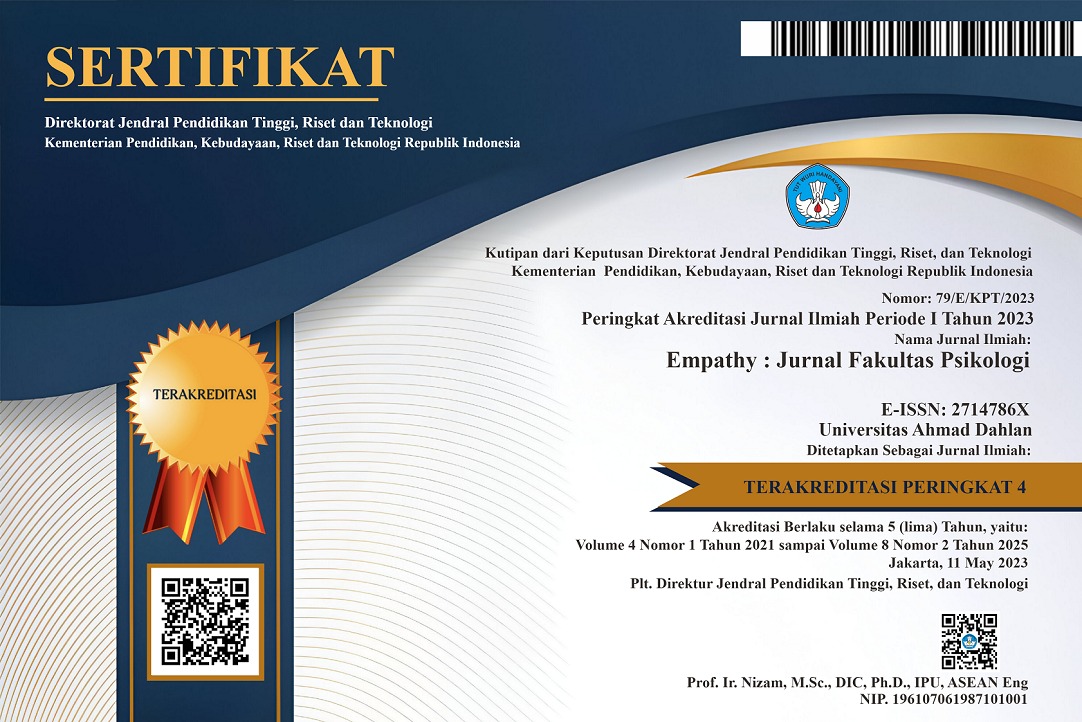Javanese Prosocial Behavior in The Rewang Tradition
DOI:
https://doi.org/10.12928/empathy.v6i1.25400Keywords:
Rewang, Prosocial Behavior, Javaneese SocietyAbstract
Perilaku Prososial Masyarakat Jawa dalam Tradisi Rewang
Javanese culture gave birth to many local wisdoms and traditions that have been passed down from generation to generation until today. One of the traditions that is maintained and is still often found is the rewang tradition. The rewang tradition is a form of prosocial behavior in Javanese society which is carried out with the aim of helping community members who have a purpose in the form of marriage. This study aims to understand and describe the prosocial behavior of the Javanese community in the rewang tradition. The method used in this research is a qualitative method with the data collection technique used is literature study. The research results obtained in this study indicate that the rewang tradition can be seen as a form of prosocial behavior carried out by the Javanese community. This can be explained by looking at the motives and factors that cause the emergence of prosocial behavior.
References
Andayani, T. R. (2020). Sumber informasi serta dampak penerapan pembatasan sosial dan fisik pada masa pandemi COVID-19: Studi eksploratif di Indonesia. Jurnal Psikologi Sosial, 19(2), 11–121. https://doi.org/10.7454/jps.2021.13
Astiyanto, H. (2006). Filsafat Jawa (Menggali Butir-Butir Kearifan Lokal). Yogyakarta: Shahida Yogyakarta.
Baron, R. A., & Branscombe, N. R. (2012). Social psychology 13th edition. United States of America: Pearson Edication.
Baron, R. A., & Byrne, D. (2005). Psikologi Sosial. Jakarta: Erlangga.
Batson, C. D. (2011). Altruism in Humans. New York: Oxford University Press.
Eisenberg, N., & Mussen, P. (1989). The roots of prosocial behavior in children. Cambridge University Press.
Geertz, C. (1983). Local Knowledge; Further Essays in Interpretive Anthropology. New York: Basic Book, Inc., Publisher.
Grueneisen, S., & Warneken, F. (2022, Februari 1). The development of prosocial behavior—from sympathy to strategy. Current Opinion in Psychology, Vol. 43, hlm. 323–328. Elsevier B.V. https://doi.org/10.1016/j.copsyc.2021.08.005
Grusec, J., Davidov, M., & Lundell, L. J. (2002). Prosocial and helping behavior.
Grusec, J. E., & Sherman, A. (2011). Prosocial behavior. In M. K. Underwood & L. H. Rosen (Eds.). Social Development: Relationships in Infancy, Childhood, and Adolescence , 263–286.
Hasbullah. (2012). REWANG: Kearifan Lokal dalam Membangun Solidaritas dan Integrasi Sosial Masyarakat di Desa Bukit Batu Kabupaten Bengkalis. Jurnal Sosial Budaya, 9(2), 231–243.
Khumairoh, L. (2022). Tradisi rewangan dan interaksi sosial dalam masyarakat muslim di desa gedangkulut, kecamatan cerme, kabupaten gresik (perspektif teori interaksionisme simbolik herbert blumer).
Koentjaraningrat. (1981). Pengantar Ilmu Antropologi. Yogyakarta: Djembatan.
Koentjaraningrat. (2004). Manusia dan Kebudayaan di Indonesia / Koentjaraningrat. Jakarta: Djambatan.
Pardi, S. (2004). Kamus Praktis Jawa Indonesia. Yogyakarta: IQ Wacana.
Penner, L. A., Dovidio, J. F., Piliavin, J. A., & Schroeder, D. A. (2005). Prosocial behavior: Multilevel perspectives. Annual Review of Psychology, 56, 365–392.
Ritzer, G. (2012). Teori Sosiologi. Yogyakarta: Pustaka Pelajar.
Romli, M. (2020). Tradisi rewang sebagai kearifan lokal masyarakat gunung kidul yogyakarta oleh. Dalam jipsindo (Vol. 7).
Schroeder, D. A., & Graziano, W. G. (2018). Prosocial behavior. Dalam Getting grounded in social psychology: The essential literature of beginning researcher (hlm. 245–285).
Sudrajat, S., Suryo, D., & Siswoyo, D. (2018). Moral Values of Javanese Leader in Serat Wedhatama. Asian Social Science, 14(3), 49. https://doi.org/10.5539/ass.v14n3p49
Sulistyowati, F. (2021). Gotong Royong sebagai Wujud Perilaku Prososial dalam Mendorong Keberdayaan Masyarakat Melawan Covid-19. Dalam Jurnal Masyarakat dan Desa (Vol. 1).
Syahputra, M. A. (2021). Tradisi rewangan dan interaksi sosial masyarakat kelurahan gunung terang kecamatan langkapura bandar lampung.
Tiezzi, E., Marchettini, N., & Rosini, M. (2003). Extending the environmental wisdom beyond the local scenario: eco-dynamic analysis and the learning community. Transactions on Ecology and the Environment, 63. Diambil dari www.witpress.com,
Weinstein, N., & Ryan, R. M. (2010). When helping helps: Autonomous motivation for prosocial behavior and its influence on well-being for the helper and recipient. Journal of Personality and Social Psychology, 98(2), 222–244.
Wewenkang, D. B. P., & Moordiningsih, M. (2016). Studi Fenomenologi Konteks Budaya Jawa dan Pengaruh Islam: Situasi Psikologis Keluarga dalam Membangun Empati Pada Remaja. Indigenous: Jurnal Ilmiah Psikologi, 1(1), 1. https://doi.org/10.23917/indigenous.v1i1.3129
Downloads
Published
Issue
Section
License
Authors who publish with Empathy: Jurnal Fakultas Psikologi agree to the following terms:
- Authors retain copyright and grant the journal right of first publication with the work simultaneously licensed under a Creative Commons Attribution License (CC BY-SA 4.0) that allows others to share the work with an acknowledgment of the work's authorship and initial publication in this journal.
- Authors are able to enter into separate, additional contractual arrangements for the non-exclusive distribution of the journal's published version of the work (e.g., post it to an institutional repository or publish it in a book), with an acknowledgment of its initial publication in this journal.
- Authors are permitted and encouraged to post their work online (e.g., in institutional repositories or on their website) prior to and during the submission process, as it can lead to productive exchanges, as well as earlier and greater citation of published work.

This work is licensed under a Creative Commons Attribution-ShareAlike 4.0 International License.



